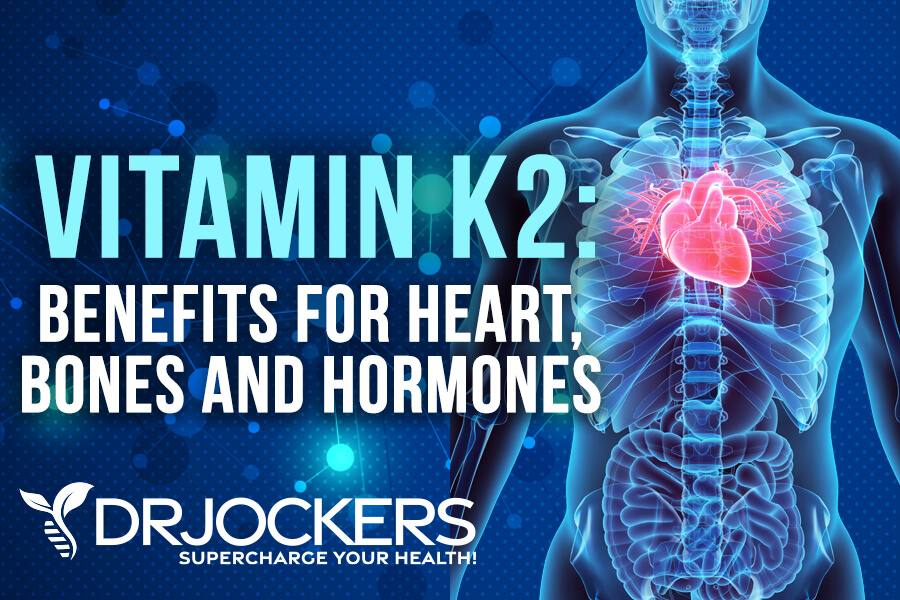 Vitamin K2: Benefits for Heart, Bones and Hormones
Vitamin K2: Benefits for Heart, Bones and Hormones
Vitamin K2 is a fat-soluble vitamin that plays a critical role in bone and cardiovascular health. Besides cardiovascular and bone health, it may help to improve dental health, calcium metabolism, hormonal balance, immune function, and kidney health. The sources of vitamin K2 include fermented foods and certain animal products. However, since deficiencies can be common, you may benefit from additional supplementation to ensure you meet your needs.
In this article, you will learn what vitamin K2 is. You will understand the difference between vitamin K1 and vitamin K2. I will go over the symptoms of vitamin D2 deficiency. I will explain the benefits of vitamin K2.
You will learn about the best food sources of vitamin K2. I will discuss the connection between the microbiome and K2 production. I will share the best K2 supplements and dosages. I will go over the potential risks and side effects of vitamin K2. I will share two of my favorite supplements with vitamin K2.

What is Vitamin K2?
Vitamin K was originally discovered in 1929 by the Danish scientist Henrik Dam. Dam investigated the role of cholesterol as an essential nutrient by feeding chickens a cholesterol-deficient diet.
After a few weeks the animals developed bleeding disorders that could not be restored by adding purified cholesterol to their diet. They discovered another nutrient that coupled with cholesterol to create the coagulation response. The new vitamin was named K as it was discovered in Germany as Koagulations vitamin.
Vitamin K2 is a fat-soluble vitamin that plays a crucial role in bone and cardiovascular health. It’s part of the vitamin K family. You may know about vitamin K1, another member of the vitamin K family.
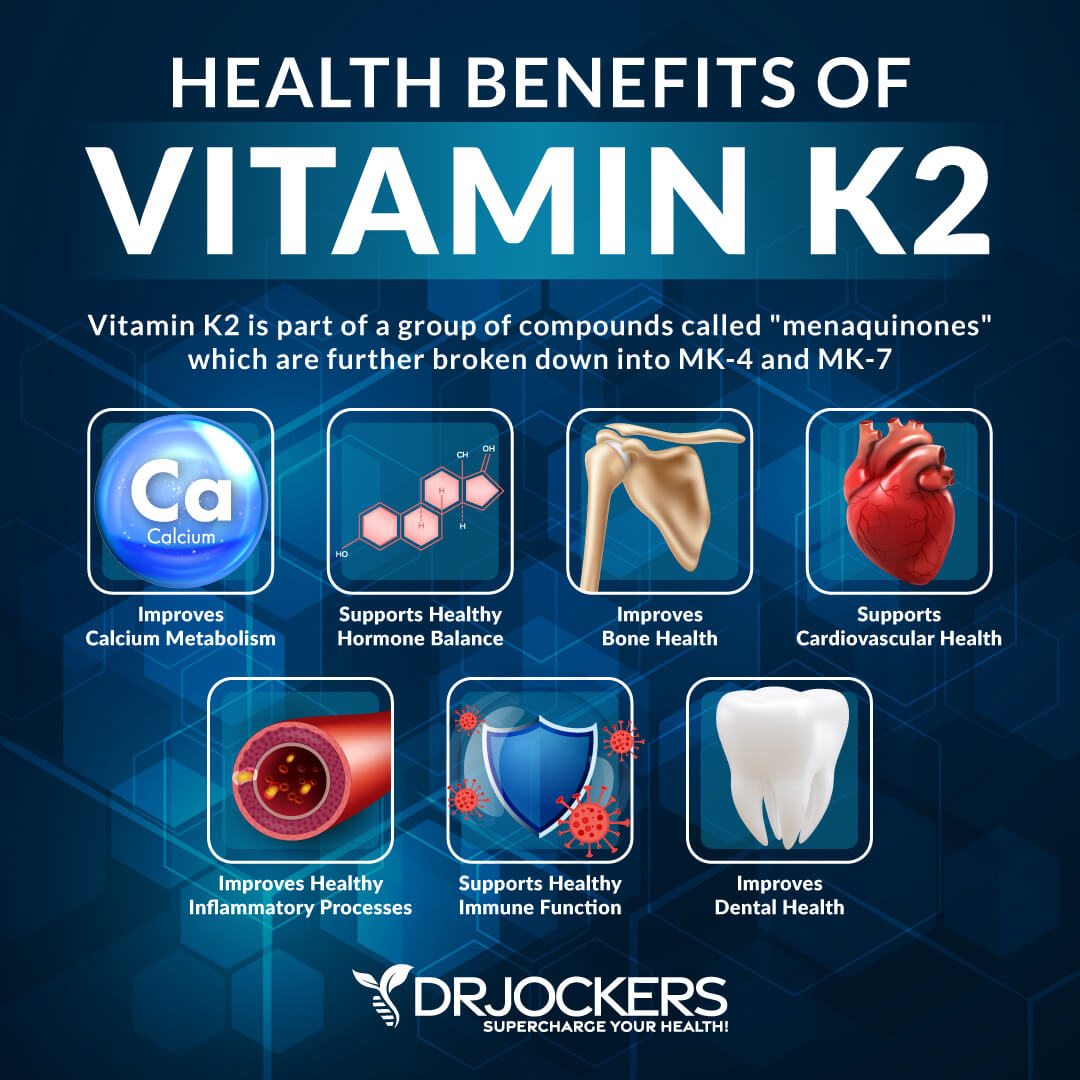
Difference Between Vitamin K1 and K2:
Vitamin K1 is mainly found in leafy greens while vitamin K2 is mostly found in certain animal products and fermented food. Vitamin K1 is phylloquinone and vitamin K2 is known as menaquinone (1, 2).
Vitamin K2 is a recently discovered vitamin that plays a critical role in many areas of your body. It plays a role in calcium metabolism, including allowing your body to use calcium better and preventing calcification of your arteries.
Thus, it plays a role in reducing blood clotting and heart disease and protecting your bones from osteoporosis. It may also offer anti-inflammatory properties.
Vitamin K2 can be found in several forms, including MK-4 and MK-7. These two are different when it comes to bioavailability and duration in the body. Menaquinones compounds are abbreviated as MK, and both MK4 and MK7 are types of menaquinones.
MK-4 has been the main focus of most studies on vitamin K2. However, MK-7, which is found in fermented foods, may be even more effective for long-term bone and heart health. Moreover, MK-8, another form, may also offer unique abilities and benefits.
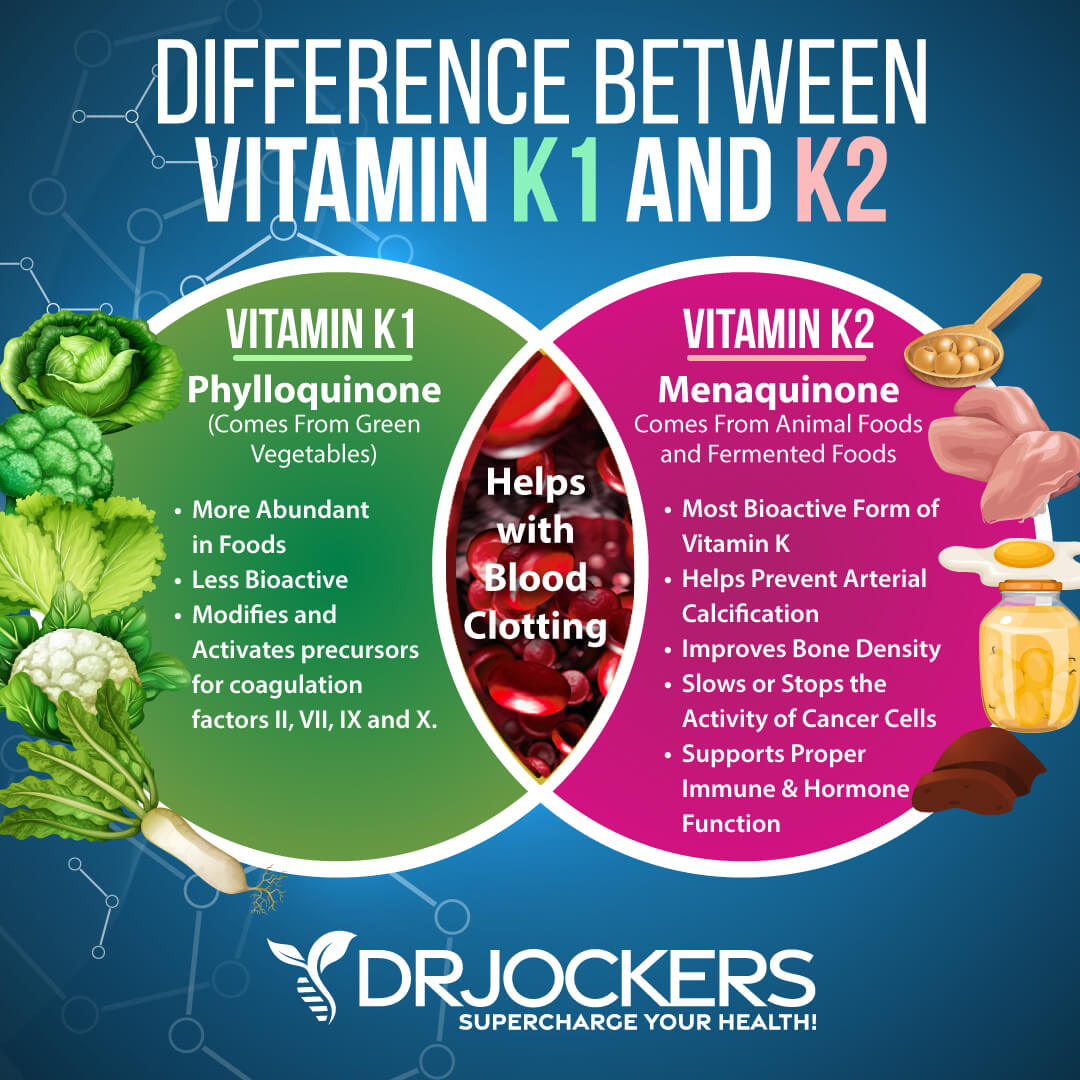
Difference Between Vitamin K1 and K2
Vitamin K1 and K2 are different forms of vitamin K. While vitamin K1 comes from mostly plant sources, vitamin K2 comes from fermented foods and some animal products. Though they are two forms of the same vitamin, they work very differently. Though vitamin K1 is more available, it is much less bioactive in humans than its counterpart, vitamin K2.
Vitamin K1 is still important and beneficial for your body. However, you generally don’t have to worry about your vitamin K1 levels and getting its benefits. Not getting enough vitamin K2 may cause issues though.
Most people get about 10 times more vitamin K1 than vitamin K2 if they rely on diet alone. Vitamin K1 deficiency is rare, many consider it to be non-existent. However, vitamin K2 deficiency is more common. Why is it a problem?
Vitamin K2 is much better at protecting your bones, teeth, and tissues than vitamin K1 because it gets distributed across your body in your tissues and bones easily. Vitamin K1, on the other hand, moves to the liver to be converted and then to your bloodstream quickly. It can be beneficial for healthy blood clotting but less so for your bones and teeth.
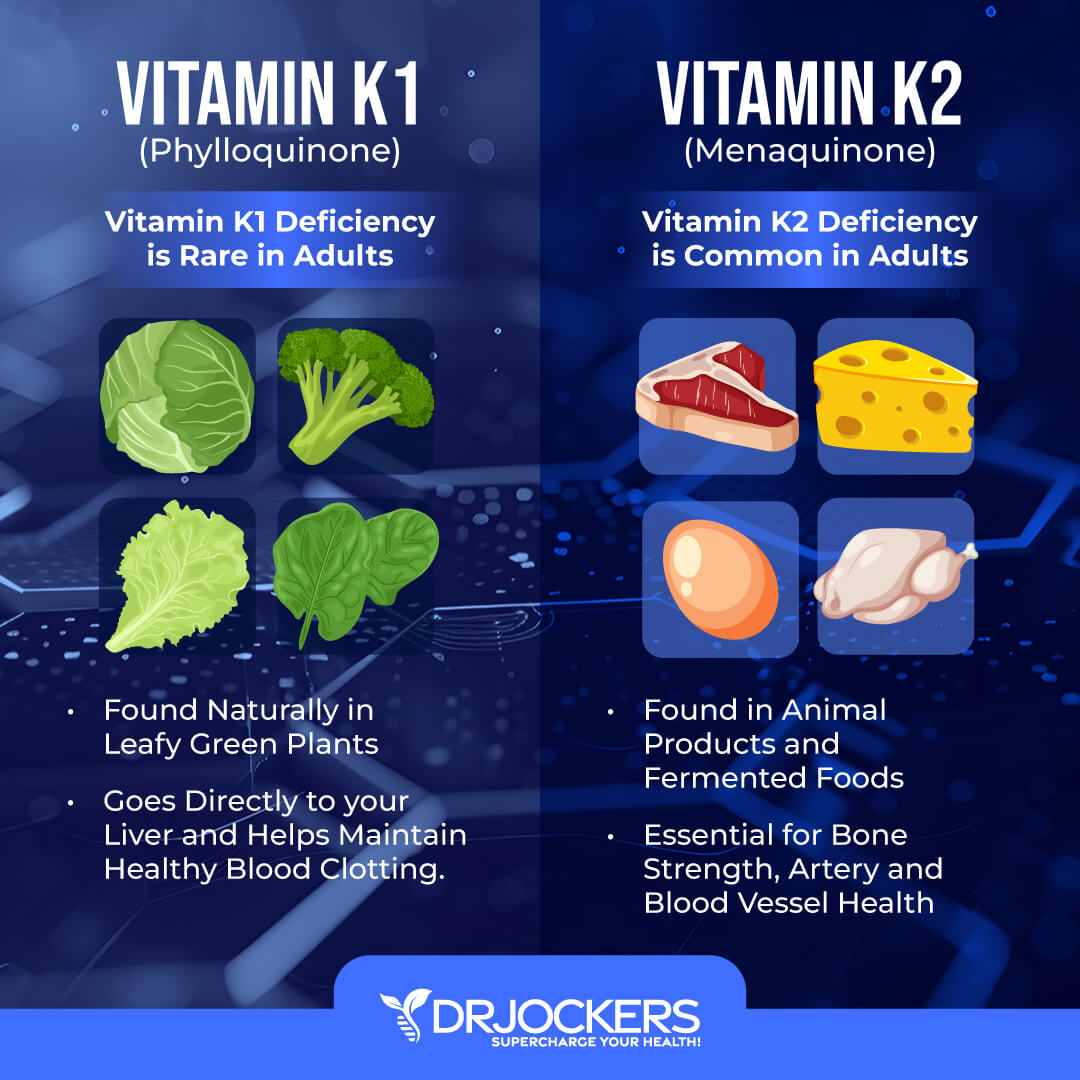
Symptoms of Vitamin K2 Deficiency
Symptoms of vitamin K2 deficiency may include:
- Problems related to blood vessel function and heart health, including arterial calcification, high blood pressure, and blood clotting issues
- Poor bone metabolism, which may increase the risk of osteoporosis and hip fractures
- Dental issues, including tooth decay and cavities
- Kidney stones
- Gallstones
- Spider veins or varicose veins
- Blood sugar imbalances and an increased risk of diabetes
- Indigestion, diarrhea, bloody stool, and other symptoms of inflammatory bowel disease
- Metabolic issues
- Increased morning sickness if you are pregnant
The risk of vitamin K2 deficiency is lower in industrialized nations, however, newborn babies and infants are at risk everywhere, because their digestive system cannot make vitamin K2 yet.
If you are an adult, you may have an increased risk of vitamin K2 deficiency if you are experiencing the following
- Malnutrition due to calorie restrictions, eating disorders, or poverty
- Have an inflammatory bowel disease, including Crohn’s disease or ulcerative colitis
- Prolonged diarrhea or vomiting
- Alcoholism and excessive consumption of alcohol
- Use of certain medications that may interfere with vitamin K2 absorption or conversion, including antibiotics, antacids, blood thinners, seizure medications, statin drugs for high cholesterol, aspirin, medication for osteoporosis, and certain cancer treatment medications
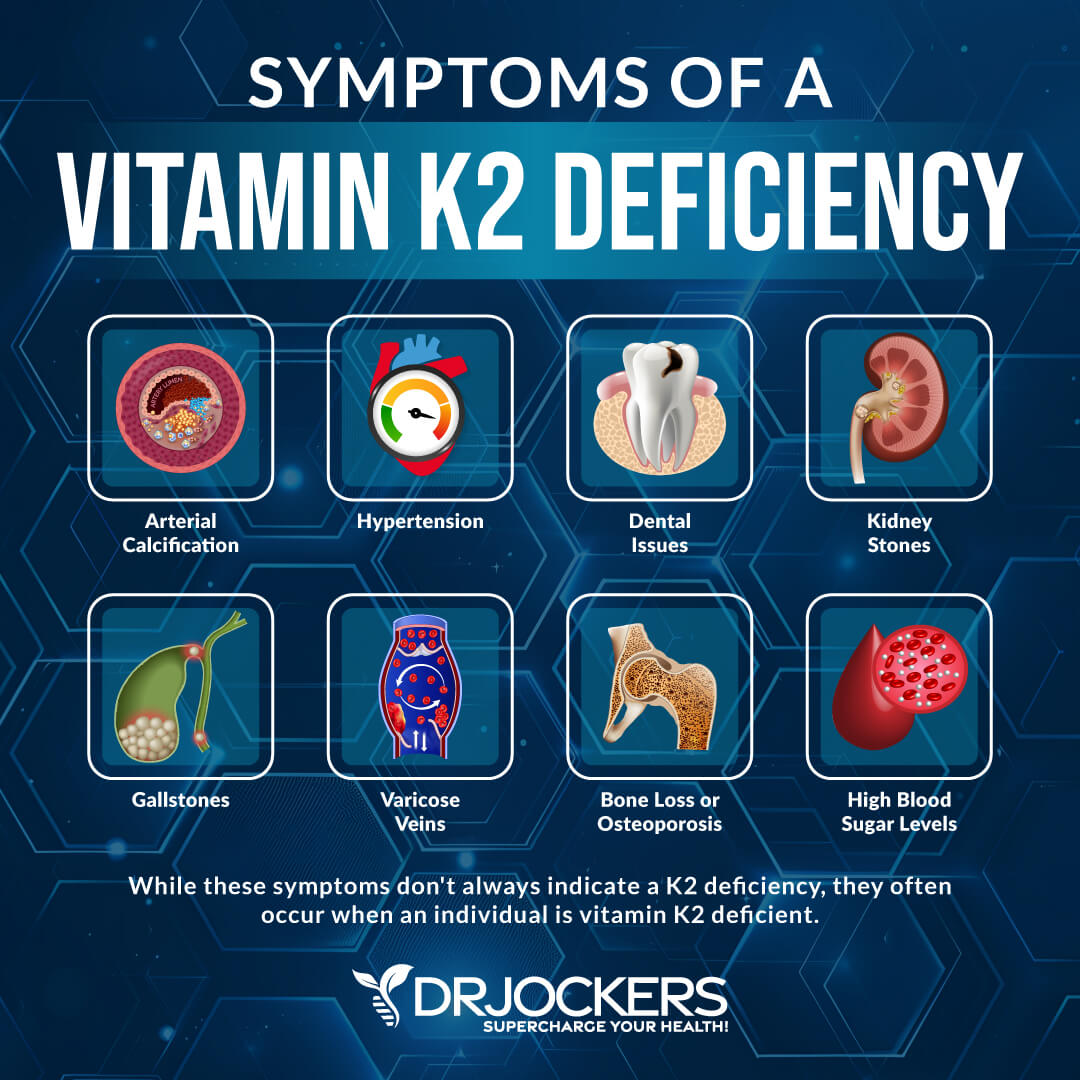
Benefits of Vitamin K2
Let’s look at the benefits of vitamin K2.
Regulates Calcium Metabolism
One of the main functions of vitamin K2 is regulating calcium metabolism. It helps to control where and how much calcium accumulates in your body. This can support your bones, skeleton, teeth, heart, arteries, and nervous system.
You may be surprised about this. The general recommendation is to take calcium to support your bones and reduce osteoporosis. So why are we talking about vitamin K2 and your bone health? Vitamin K2 actually helps the job of calcium.
Vitamin K2 is necessary to convert a critical bone-building protein called osteocalcin. Osteocalcin is a necessary protein that helps maintain calcium homeostasis in bone tissue.
It works with osteoblast cells to build healthy bone tissue. Inadequate K2 inhibits osteocalcin production and reduces calcium flow into bone tissue. This leads to reduced bone mass and a weakened bone matrix.
According to a 2013 review published in the European Review for Medical and Pharmaceutical Sciences, vitamin K2 helps in the regulation of calcium deposition in the bone (3). Vitamin K2 works together with vitamin D to stop osteoclasts, which cause bone resorption.
Vitamin D acts to increase calcium levels in the intestine and increases calcium absorption into the bloodstream. Vitamin K2 works to activate osteocalcin to help move calcium out of your bloodstream and deposit it into your bones and teeth. This is how vitamin D3, vitamin K2, and calcium work together for bone health.
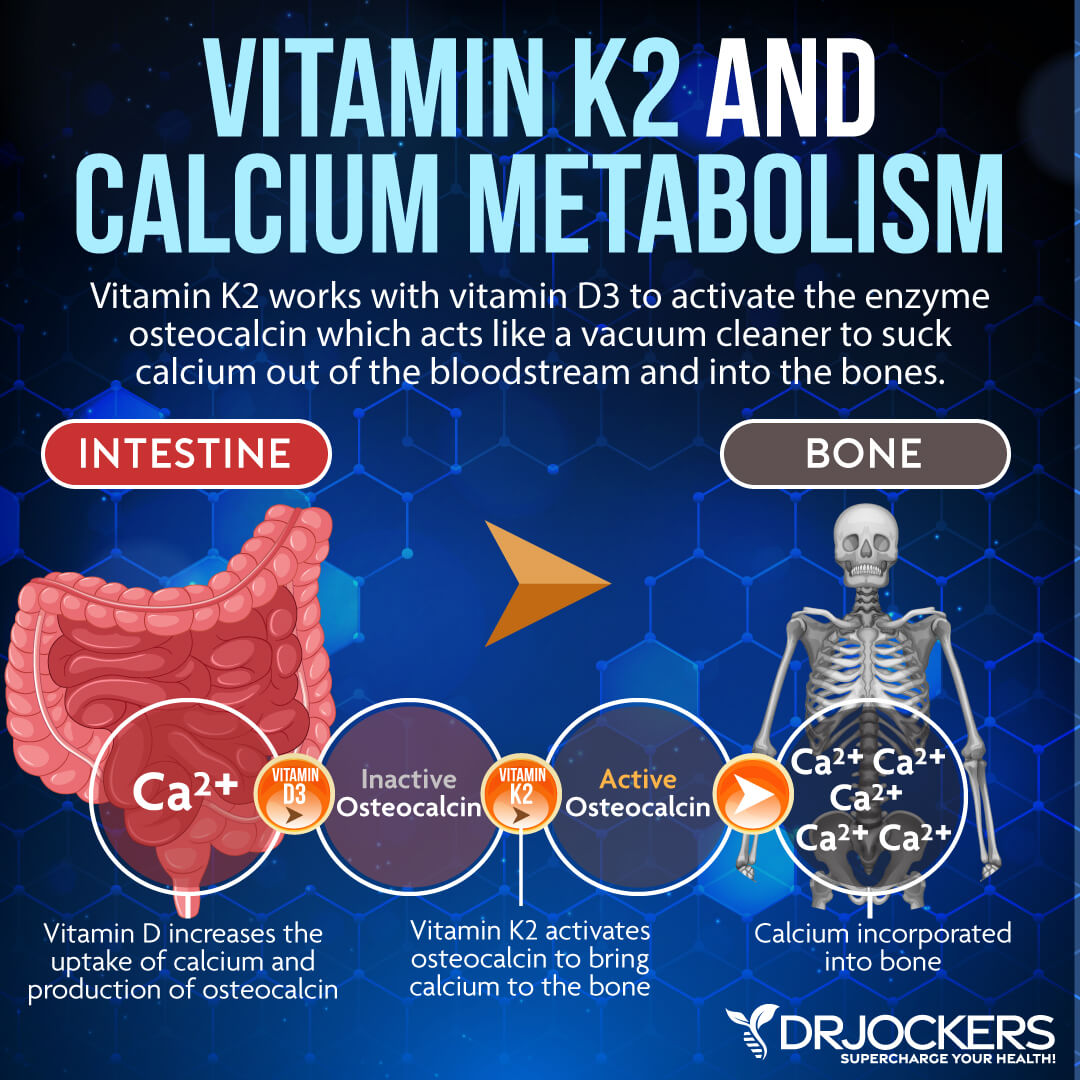
Improves Cardiovascular Function
Another benefit of vitamin K2 is improved cardiovascular function. It may be beneficial for atherosclerosis and other heart-related issues.
Vitamin K and vitamin D work to increase a substance called Matrix GLA protein (MGP). This protein protects the blood vessels from calcification by congregating around the elastic fibers of the arterial lining and guarding against calcium crystal deposition.
Some researchers believe that MGP is the most powerful inhibitor of soft tissue calcification presently known. According to a 2015 study published in the Integrative Medicine Clinican’s Journal, vitamin K2 may help to inhibit arterial stiffening and arterial calcification (4).
According to a 2004 study published in the Journal of Nutrition, out of 4,807 individuals who were followed for this study, those with the highest vitamin K2 levels had the lowest risk of aortic calcification (5). They found that vitamin K2 may reduce mortality related to heart disease by 51 percent and mortality from all causes by 26 percent.
A 2017 study published in Alternative Therapies in Health and Medicine has found that vitamin K2 may increase maximum cardiac output by 12 percent and improve overall cardiovascular function by supporting mitochondrial health and ATP production (6).
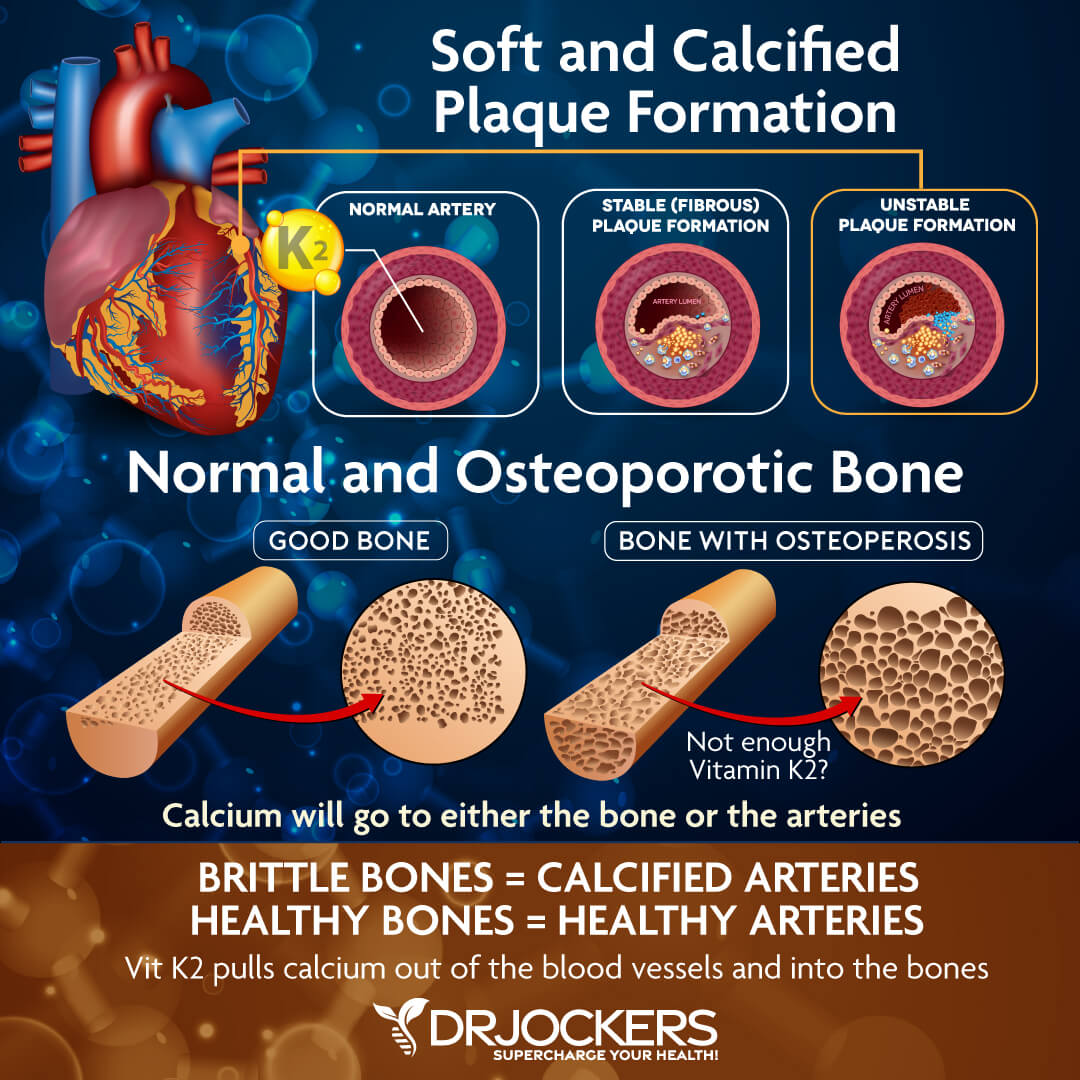
Supports Bone and Dental Health
The next important benefit of vitamin K2 is supporting bone and dental health. This may not be surprising since vitamin K2 helps calcium metabolism. Vitamin K2 can take calcium from the bloodstream and move it to your bones and teeth.
According to a 2017 article published in the Journal of Nutrition and Metabolism, vitamin K2 may support the treatment of osteoporosis, alongside vitamin D3 and calcium (7). A 2015 review published in the Osteoporosis International has found that vitamin K2 may help to support vertebral bone mineral density and as a result, reduce the risk of fractures in postmenopausal females with osteoporosis (8).
The effects of this nutrient on bone health may be beneficial for jaw and teeth health and reduce the risk of tooth decay and cavities. According to a 2023 study published in Healthcare (Basel), there may be a link between vitamin K2 levels and the risk of periodontitis (9). It may also be important during pregnancy as bone formation and fetal growth is so critical during this time (10).
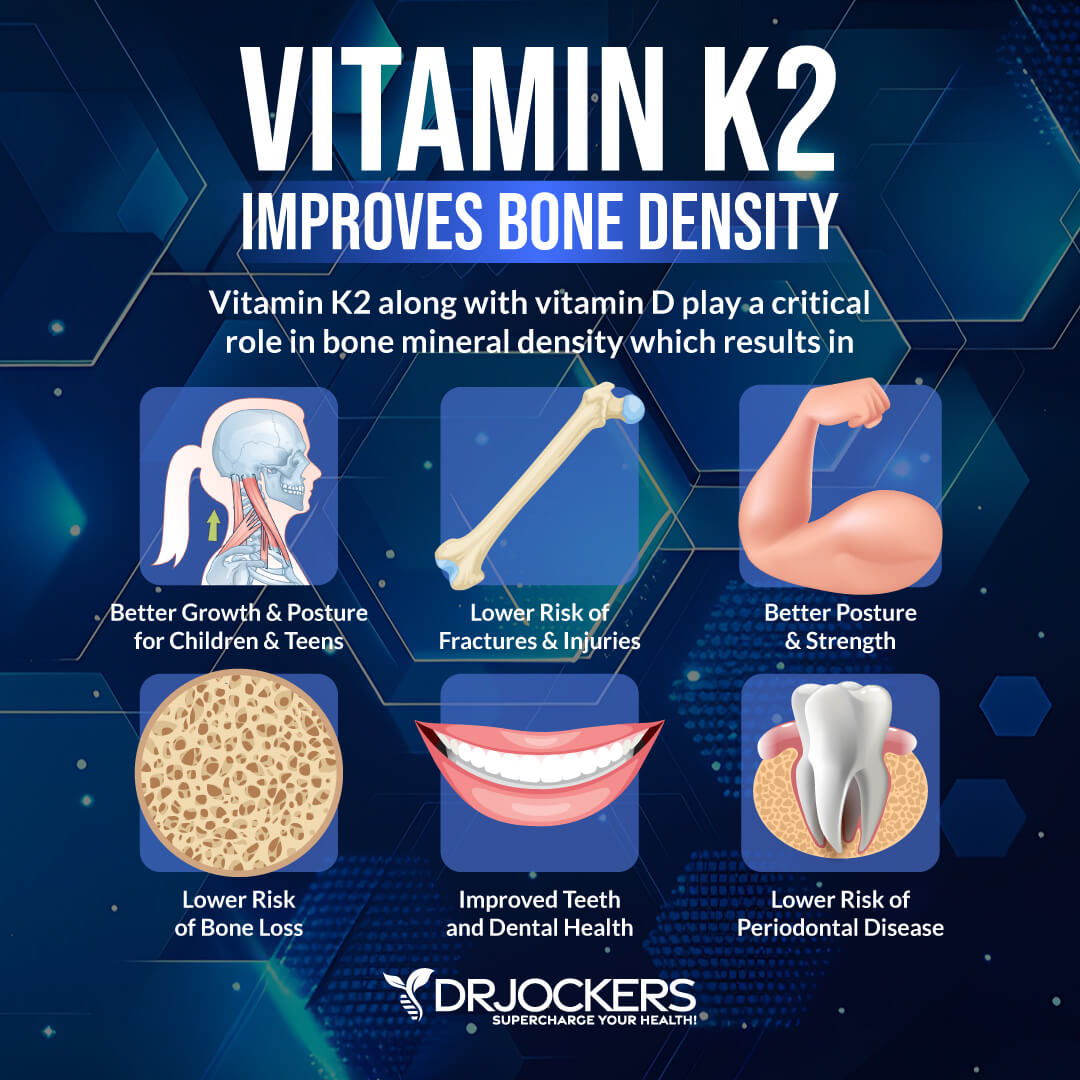
Improves Hormonal Balance
Another potential benefit of vitamin K2 is improved hormonal balance. Vitamin K2, in your bone, is used to make osteocalcin. Osteocalcin is a hormone with positive hormonal and metabolic effects. As a fat-soluble vitamin, vitamin K2 plays a role in sex hormone production, which may help to reduce the risk and improve hormone-related health issues.
According to a 2017 study published in Experimental and Clinical Endocrinology and Diabetes, vitamin K2 and vitamin D may benefit those with polycystic ovarian syndrome (PCOS) (11).
According to a 2011 study published in Diabetes Care, vitamin K2 may also promote blood sugar balance and insulin sensitivity, which is not only important for those with diabetes, obesity, and other metabolic issues, but those with PCOS, as insulin resistance is relevant in this condition (12).
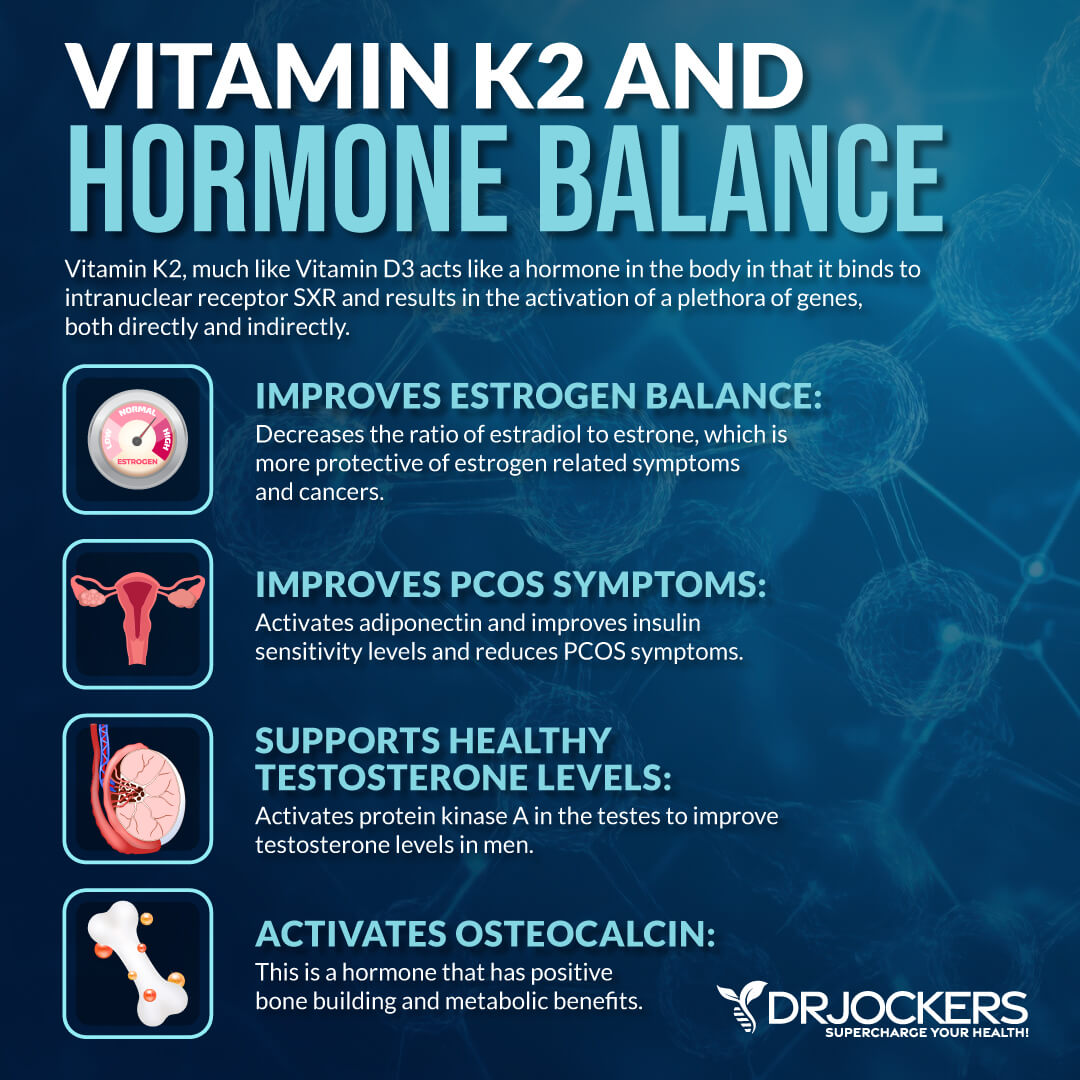
Supports Healthy Immune Function
Vitamin K2 may also help to support a healthy immune function. It may have an influence on both your innate and adaptive immune system. Vitamin K2 may help to regulate your inflammation levels. It does this by preventing the build-up of calcium in the blood vessels which can lead to inflammation and immune dysfunction. It may also support the immune response.
Vitamin K2 may also influence your cells directly. It can act on macrophages and other immune cells to fight pathogens. According to a 2021 study published in Cells, this can have anti-inflammatory effects (13). It also supports the production of proteins crucial for immune health, such as matrix Gla protein (MGP), which plays a role in decreasing oxidative stress and improving cellular function (14).
Overall, K2 is a valuable nutrient that plays a role in balancing the immune activity and protecting the body from infections and inflammation-related diseases, including autoimmune diseases. For example, according to a 2008 study published in the Journal of Rheumatology, it may benefit those with rheumatoid arthritis (15).
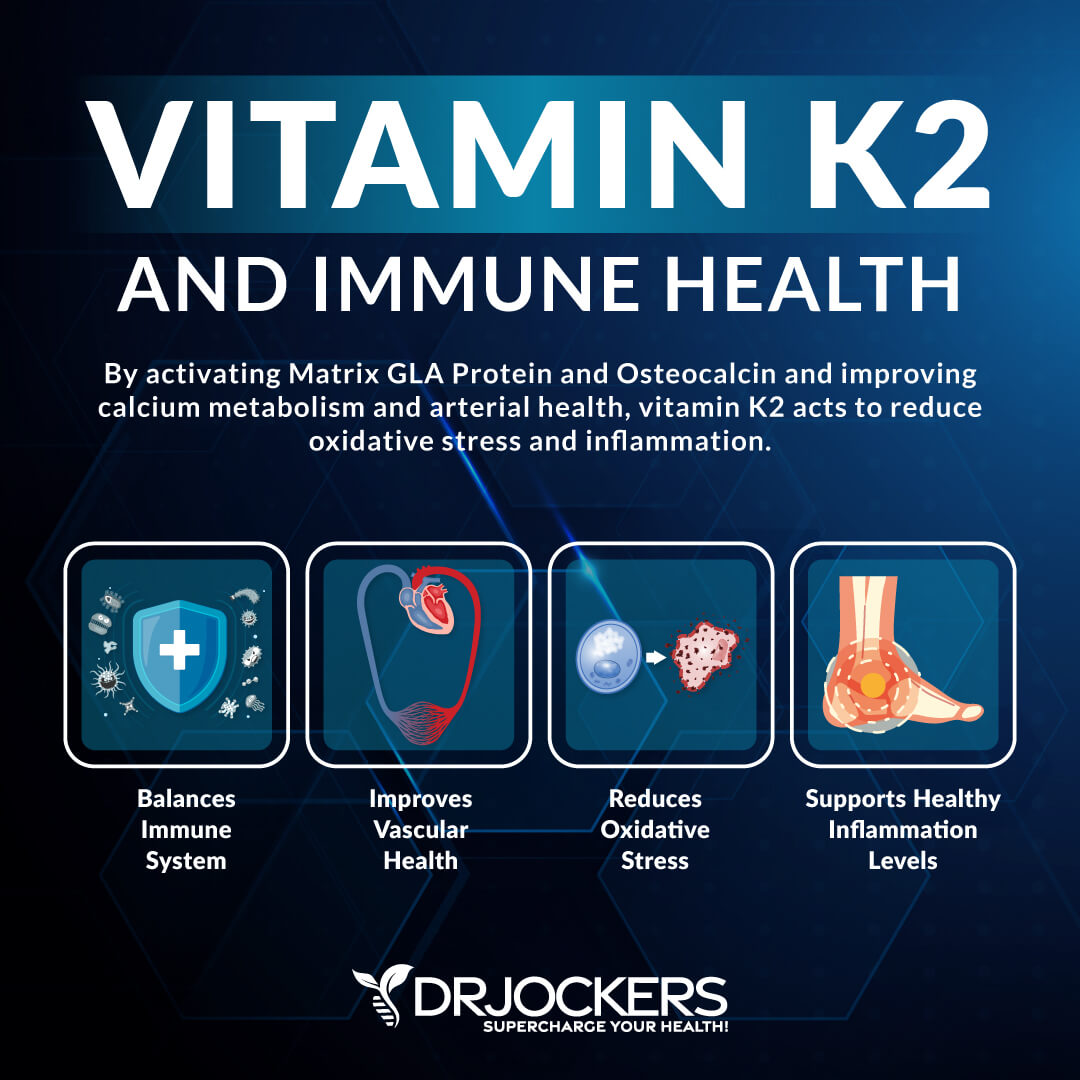
Protects Kidney Health
Finally, vitamin K2 may help to protect your kidney health as well because it can reduce the calcification of blood vessels and soft tissues, which can negatively impact kidney function.
According to a 2014 study published in the World Journal of Urology, vitamin K2 may help to reduce calcium accumulation in the wrong places, which may reduce kidney stones (16).
According to a 2010 study published in the Clinical Journal of the American Society of Nephrology, poor vitamin K2 and D3 levels may be linked to an increased risk of chronic kidney disease (17). The activation of MGP can help to reduce calcium buildup in the kidney, which may contribute to chronic kidney disease. Moreover, it may also improve blood flow and filtration in your kidneys.
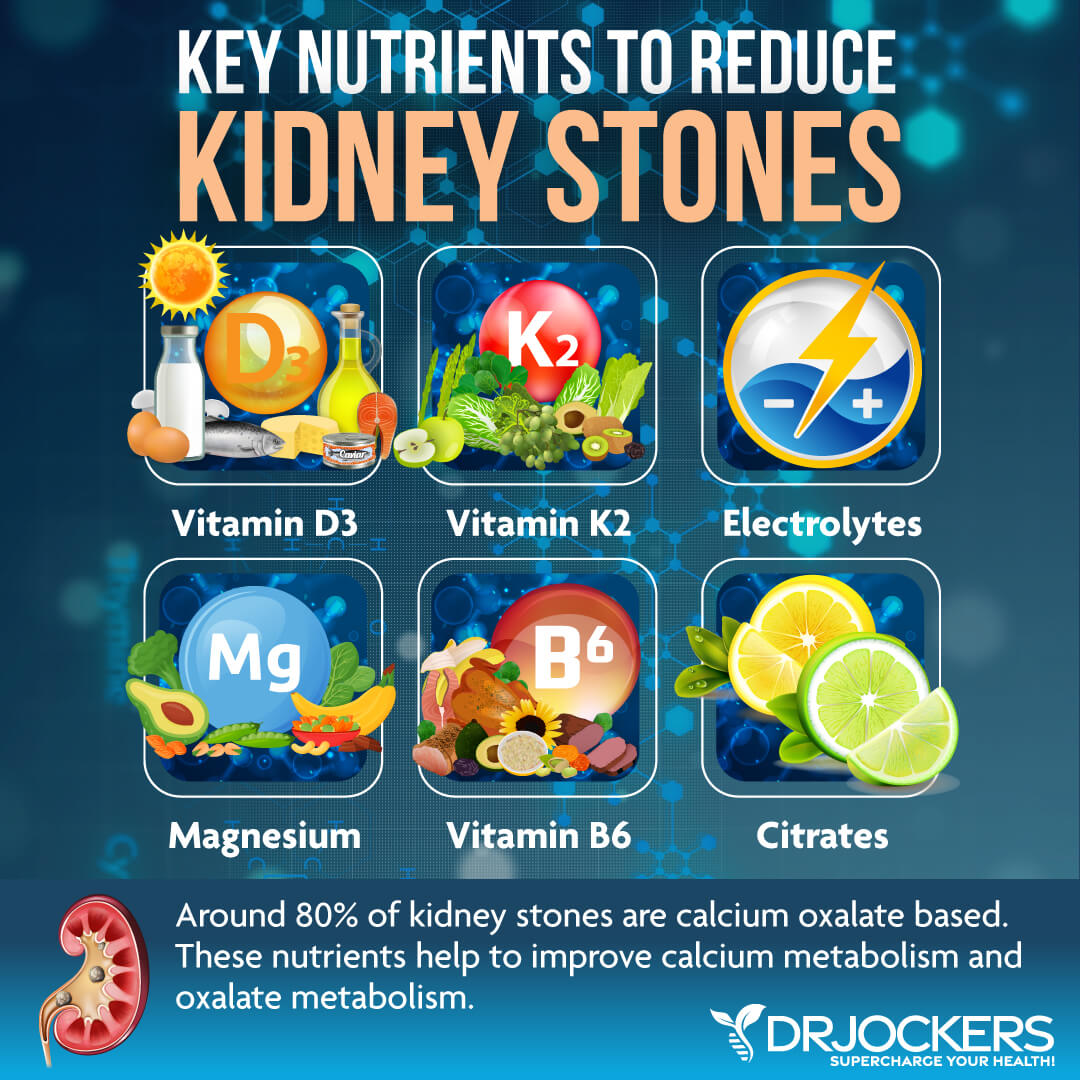
Best Food Sources of Vitamin K2
Good food sources of vitamin K2 include:
- Beef liver
- Goose liver pate
- Chicken, especially dark meat
- Ground beef
- Goose meat
- Chicken liver
- Beef kidney and other organ meat
- Natto
- Egg yolk
- Cheese, especially hard cheeses
- Grass-fed butter
- Sour cream
- Whole milk
If you are buying any of these animal products, make sure to buy grass-fed meat and pasture-raised poultry and eggs for the best quality. The higher the level of vitamin K1 a farm animal gets in their diet, the higher the level of K2 their tissues will have. This means higher levels of this nutrient on your plate and in your body. Grass-fed and pasture-raised animals are fed a higher quality diet with more vitamin K1.
Meeting your vitamin K2 needs can be hard or impossible on a vegan or vegetarian diet. While there are vitamin K2 supplements to support your vitamin K2 levels, I don’t recommend following a vegan or vegetarian diet. Supplementation should be there as an added benefit to maximize your levels and improve deficiencies, not to use them instead of food sources.
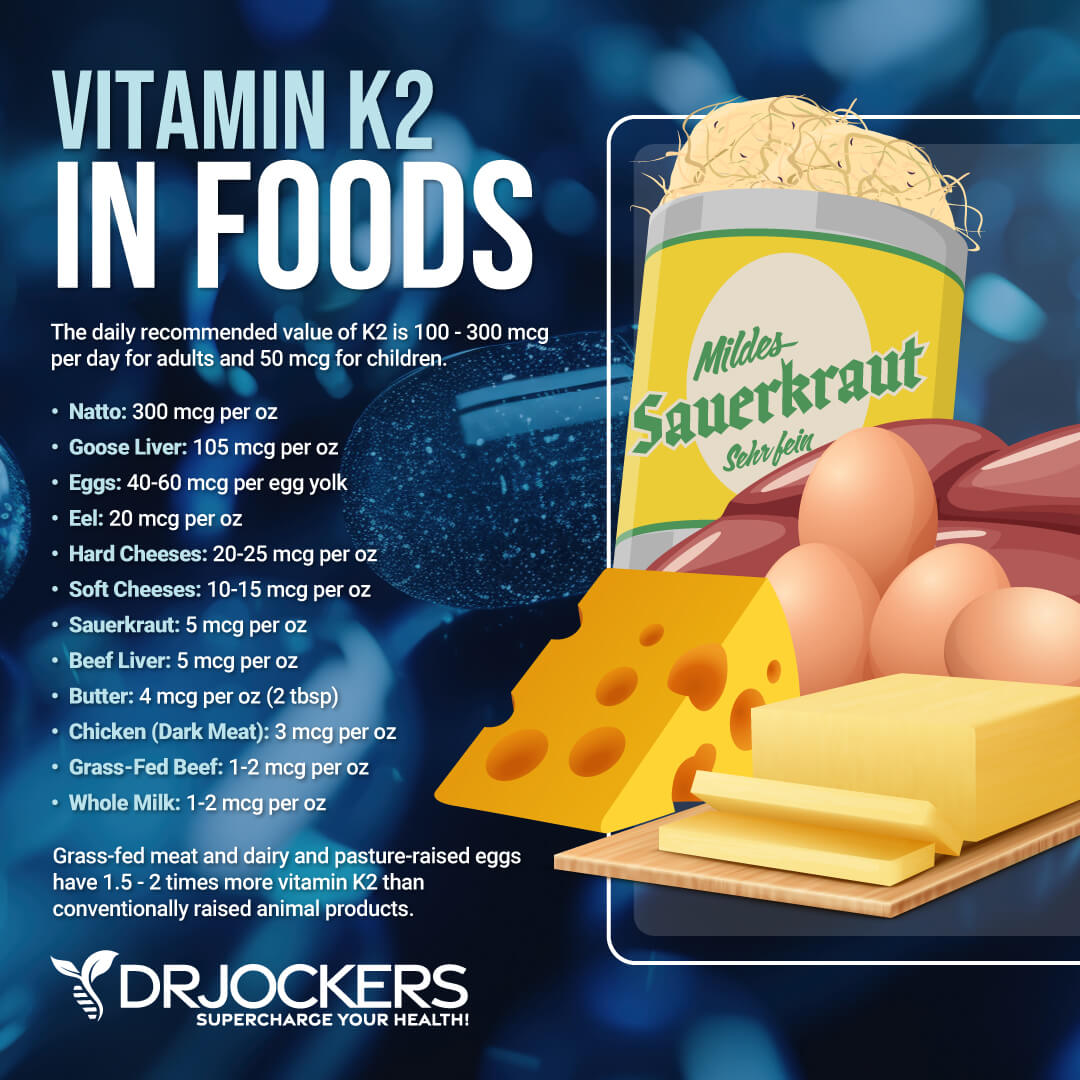
The Microbiome and K2 Production
Your microbiome is made up of trillions of microorganisms. Some of these are beneficial, others are harmful bacteria. They need to be in balance with more of the good bacteria than the bad ones to support digestion, immune defense, and overall health.
We don’t hear about this much, but one of the major functions of the gut microbiome is to make vitamins, including vitamin K2. Vitamin K1 is found in leafy greens, but vitamin K2 can be produced by your microbiome.
This is particularly true for the form MK-4. The amount your body can make depends on your gut health and microbiome composition. Vitamin K2 made in your gut adds to your body’s overall vitamin K2 pool.
Unfortunately, following a poor diet, taking antibiotics, experiencing chronic stress, being exposed to environmental toxins, and making poor lifestyle choices can significantly disrupt your gut microbiome balance, which may lower the levels of K2-producing bacteria in your gut and lead to lower vitamin K2 levels.
This is why dietary and supplemental sources of vitamin K2 are increasingly important, so you don’t have to rely on your gut only. However, supporting your gut with an anti-inflammatory, healthy diet and probiotic supplements is critical for improving gut microbiome balance and supporting natural vitamin K2 production.
In addition, eat lots of foods rich in vitamin K2, such as fermented foods, certain animal products, and natto. Supplementation can be incredibly beneficial, but gut-support, diet, and lifestyle shouldn’t be overlooked.
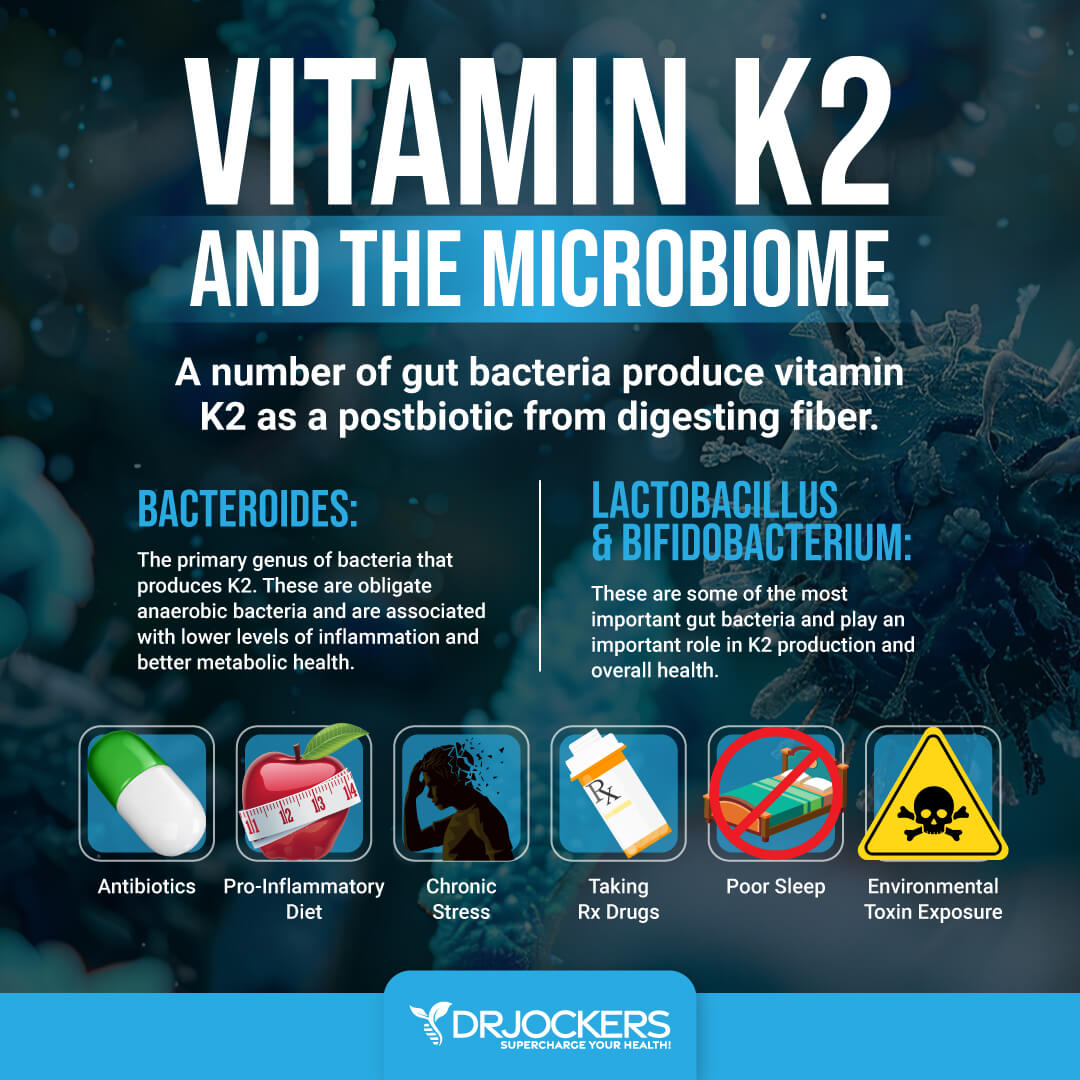
Best K2 Supplements and Dosages
To choose the best vitamin K2 supplement, I recommend that you look for a supplement that contains the MK-7 form. This form is the most bioavailable and has a longer half-life, which can allow better absorption and sustained levels in the body. Choose a reputable brand with third-party testing to ensure purity and potency.
It may be beneficial to choose a supplement that combines vitamin D3 if you want additional benefits for bone health. Additionally, there are supplements that offer other nutrients, including immune-boosting vitamins, minerals, and herbs. I will share some of my recommendations later in this article. Choose a supplement that has a dose that suits your needs.
The best dosage is between 50 to 300 mcg of vitamin K2 daily. The RDA requirement is 90 mcg of vitamin K2 for females and 120 mcg for males (1). Other experts claim it should be between 150 to 400 mcg per day.
Ideally, most of your intake should come from foods instead of dietary supplements. And most people will get at least some vitamin K2 into their diets. Supplementation should help to reduce the risk or improve deficiencies in vitamin K2.
Your dosage should be determined based on whether you have a deficiency in vitamin K2, as well as your diet, lifestyle, and health. For example, if you are at a higher risk of bone loss or heart disease, you may benefit from taking a high dose of vitamin K2, such as 200 mcg or more.
However, if you are a healthy individual with a balanced diet, rich in vitamin K2 foods, and looking to maintain health, you may benefit from a lower dose of between 50 to 200 mcg. I recommend working with a functional medicine doctor to figure out the best dosage for you.
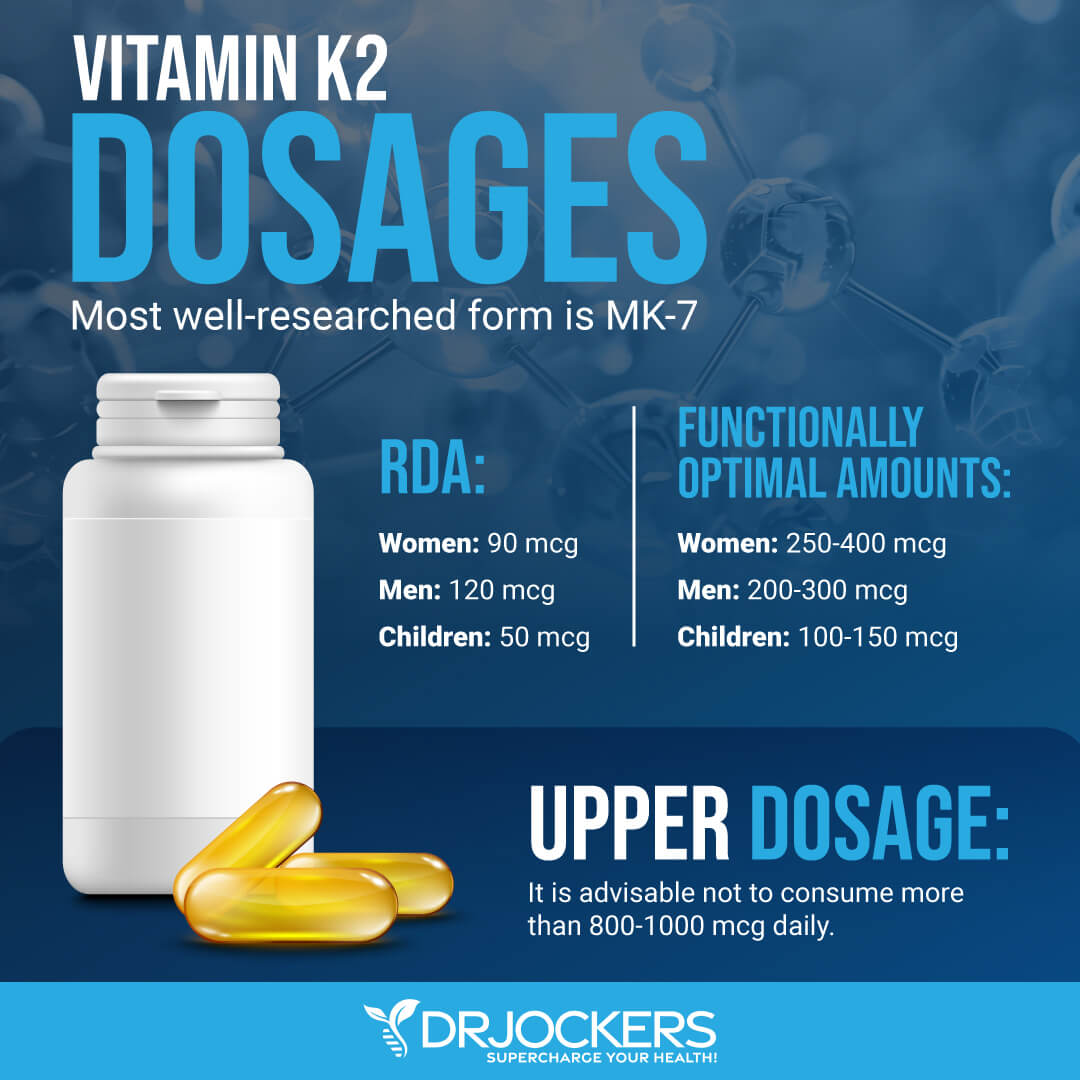
Potential Risks and Side Effects
Taking vitamin K2 supplements is generally safe. Side effects are rare and toxicity from food alone is rare as well. Most people can tolerate high doses.
However, we need to be aware of potential interactions with certain medications and potential adverse effects that may result. Vitamin K2 has a very mild impact on blood coagulation (as opposed to K1, which has a strong impact on blood coagulation). With that said, it is not advisable in higher dosages (over 200 mcg) for individuals who are taking prescription blood thinners such as Coumadin.
Taken in high doses, it may increase blood clotting disorders in some cases. As with all supplements, I recommend that you work with your doctor and see if it’s right for you and at what dosage, especially if you are taking a medication or dealing with serious health issues.
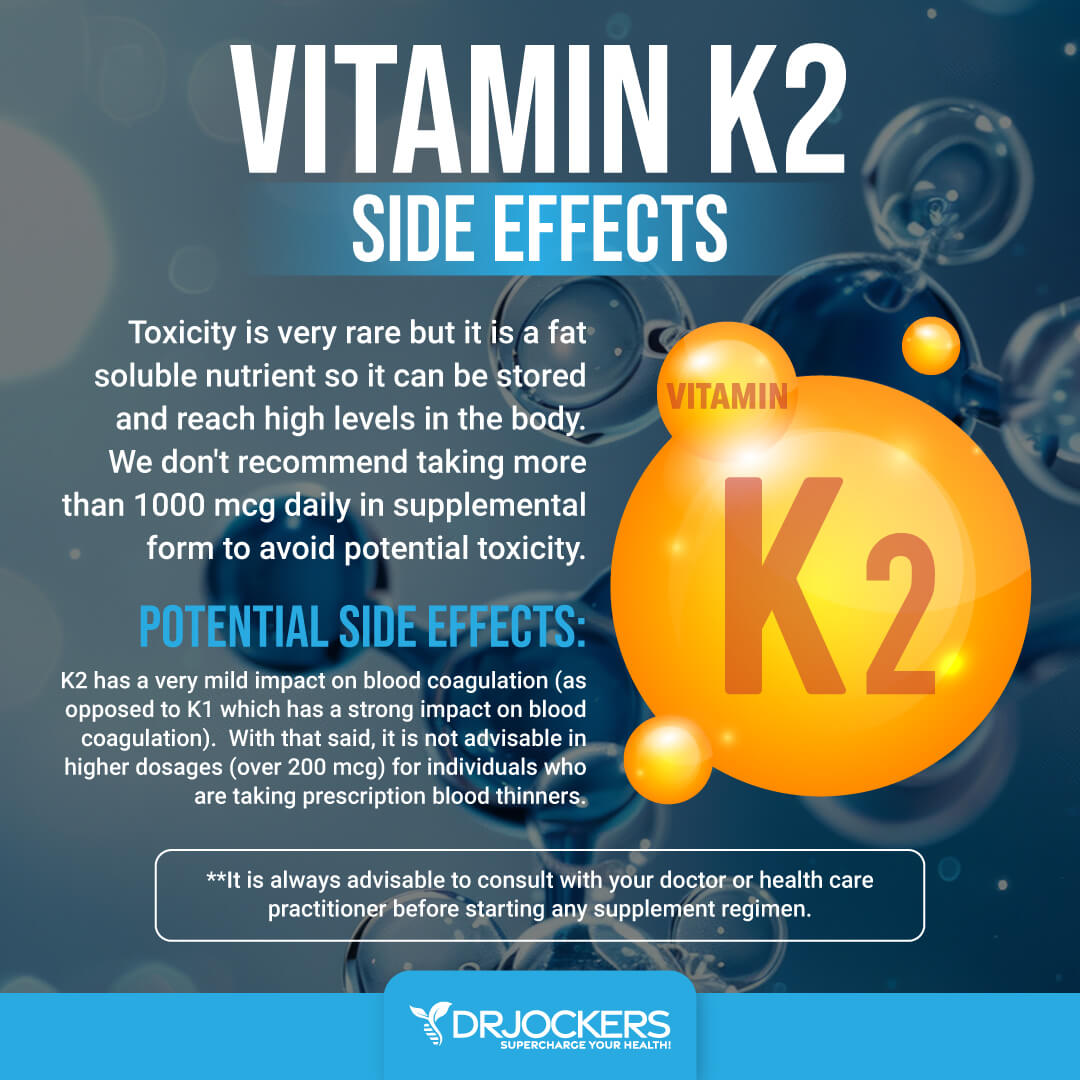
Vitamin D3/K2 Power
To improve your vitamin K2 levels, I recommend using Vitamin D3/K2 Power. It is essential to maintain healthy vitamin D3 and K2 levels throughout all stages of life, from fetal development to old age. These nutrients help support a number of important systems in the body, including healthy bones, immunity, and cardiovascular function.
Taking D3/K2 may help improve calcium absorption and inflammation control. 2 is an important nutrient to support healthy bones, joints, and cardiovascular function. D3 can act to protect an aging brain and boost overall memory and cognitive function.
This product is a 2–6-month supply of Vitamin D3 and K2. If you are severely deficient (less than 30 ng/ml) then take 1 capsule per day for 2 months or as directed by your health care practitioner. If you are using it for maintenance purposes, then I recommend 1 capsule every 2-3 days or as directed by your health care practitioner.
Immunocharge
Additionally, I also recommend using Immunocharge, not only to support normal vitamin K2 levels but also to boost your immunity. This supplement is designed to provide you with key nutrients and compounds to support your immune system. Each ImmunoCharge capsule contains the same amount of powerful immune-modulating compounds.
These include quercetin, resveratrol, vitamin D, vitamin A, selenium, zinc, vitamin C, N-acetyl cysteine (NAC, vitamin K2, and magnesium. These ingredients support the body’s natural immune mechanism to help maintain good health. Rather than taking multiple different supplements to get these key nutrients, you can get the clinical dosages within 4 capsules daily of ImmunoCharge.
This supplement can help to improve vitamin deficiencies linked to saggy skin, skin issues, and inflammation. Zinc, vitamin D, and selenium in ImmunoCharge can support skin health, inflammation levels, and your immune system. All ingredients support the body’s natural immune mechanism to help maintain good health.
Take 1 capsule, 2 times daily with meals for optimal absorption, or as directed by your healthcare practitioner. For advanced doses, take 2 capsules, 2 times daily with meals for optimal absorption, or as directed by your healthcare practitioner.
Final Thoughts
Vitamin K2 is a fat-soluble vitamin that plays a critical role in calcium metabolism, bone health, cardiovascular function, dental health, hormonal balance, immune function, and kidney health. The sources of vitamin K2 include fermented foods and certain animal products. I recommend that you follow my advice in this article to ensure normal levels of vitamin K2 and to protect your health.
If you want to work with a functional health coach, I recommend this article with tips on how to find a great coach. Our website offers long-distance functional health coaching programs. For further support with your health goals, just reach out and our fantastic coaches are here to support your journey.
Inflammation Crushing Ebundle
The Inflammation Crushing Ebundle is designed to help you improve your brain, liver, immune system and discover the healing strategies, foods and recipes to burn fat, reduce inflammation and Thrive in Life!
As a doctor of natural medicine, I have spent the past 20 years studying the best healing strategies and worked with hundreds of coaching clients, helping them overcome chronic health conditions and optimize their overall health.
In our Inflammation Crushing Ebundle, I have put together my very best strategies to reduce inflammation and optimize your healing potential. Take a look at what you will get inside these valuable guides below!

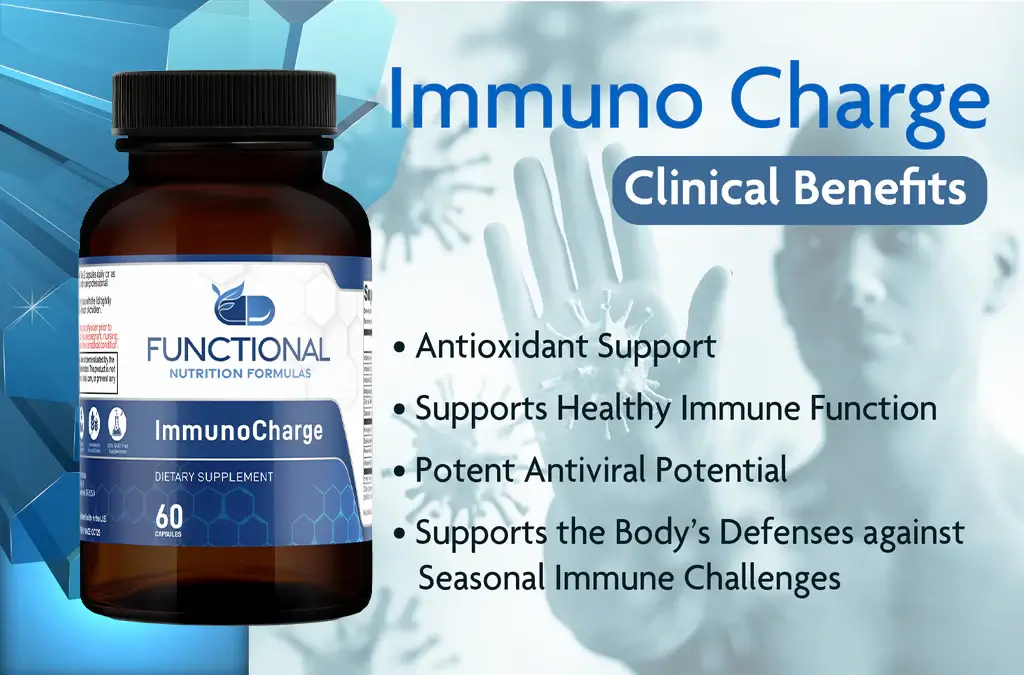





Just wanted to say that your e-mail is the one I ALWAYS enjoy receiving. I am studying to be a nutrition health coach and have learned so much from your e-mails and videos. You’re making a positive impact in this world. Thanks for sharing!
Thanks so much Carol!!!
Thanks for the information. I’ve been reading the book, Vitamin K2 and the Calcium Paradox. The chapter I’m currently on has been talking about how both Vitamin A and D3 are needed so that Vit K2 works properly; you can’t use just one in your diet or via supplementation. What’s your opinion?
Very true!! This is why we are very big on grass-fed butter/ghee, pasture-raised egg yolk and avocados which are all great sources of fat soluble vitamin A.
Please Docter is taking k2 effect the liver because I have liver problem but since I have joint I really need to take this vitamin thanks a lot for every thing
Hey Jibara, it will not negatively effect the liver. You should take K2.
I am on eloquist for a Fib and it blocks k2 . Is there anything I can do to get in balance? I hope to get off of eloquist in a couple of months.
Is there a natural product that would work as well?
Hey Mary I would recommend using supplemental Vitamin K!
Hi Dr Jockeys, I am on tamoxifen. There is any problem taking k2 and D3 , 2 in one vitamin. Thank you
No Luly there is no problem with that!
I have a spur on the base of my thumb and heel spurs both feet and I feel a little on the medial side of my elbow. Do you think K2 would help and how much? And does this effect any medications?
I had heel spurs on both ankles and they diminished after taking 5mg of MK-4 twice per day after roughly 1 month
Any interactions with Lovenox and D3/K2 liquid?
Hey Chris,
No there are not. I would recommend taking supplements away from medications however.
my father is 91. He had CVD and he had multi-bypass 23 yrs ago and stent(s) yrs ago. He takes daily aspirin, statin and a few other med’s.
His Vit D is 10 and considering D3 supplementation. Can he also take Vit k2 MK-7? what dose should he take?
His CRP is very high at 6.9.
Any other supplements you reco?
Omega 3?
Nattokinase?
Hey Murthy, Yes Vitamin D should be taken with K2, this is the version I use: https://store.drjockers.com/collections/top-sellers/products/d3-k2-power. For high CRP I use this: https://store.drjockers.com/products/pro-omega-crp
Of course you want to start with an anti-inflammatory nutrition plan as is outlined here: https://drjockers.com/5-benefits-healing-diet/
Dr Jockers
I have an urgent question. After reading this artical, i understand that if we want to take vitamin D3, we have to take it with vitamin K2 due to the advise that taking D3 (absorption of calcium might accumulate in the arteries hence needing K2 to transport calcium to the bones), but can i take k2 without taking D3 (only transporting calcium to the bones) assuming i am getting alot of sun where I live? I do not want to overdose on D3
Will taking k2 alone be ineffective to what i am trying to do i.e decalcificating calcium from my arteries
That should be okay Mab!
I have read that a combination of vitamins C and K3 is good for people who may be having a reaction to the titanium in their total knee replacement. How would you you know if this is your problem and do you know where K3 is available?
Hey Dave, thank you for reading! I have not actually heard about this.
Vitamin k2 is often neglected despite the immense health benefits.
Yes very true!!
I am on blood thinner, 15mg coumiden, can I still take Vit K-2?
It should be no problem Bernie as long as you don’t megadose!
Dear Sir,
Very informative and healthy presentation. i appreciate. Please let me know the ideal combination for Bone health including Vitamin K2 and Vitamin D3 etc.
Thanks for reading Jamil! Here are the top foods and nutrients:
https://drjockers.com/nutrients-bones/
https://drjockers.com/strong-bones/
Dr. Jockers.
I am using Thornes product.
2 drops get me 1000IU of D3 and 200mcg of K2.
They recommend two drops 1-3 times daily. I want to know how much K2 I can take in one day before it could cause a problem.
I would like to take the two drops at least 5-6 times per day. As soon as the liquid hits my tongue I feel as if it’s something I need. I start to feel a little better. I’m thinking it’s the D3 which is why I want to know what I can max up to on D and K2 per day.
Thank you,
Jay
This article has some good guidelines in it Jay! https://drjockers.com/vitamin-k2/
So a quick question. Everytime I take vitamin D, I get serious side effects for a week. I uped my magnesium intake and that only makes it worse. When I exert myself, my jaw muscles tense up and hurt real bad and all my other muscles seem to be spamsing all the time. Would taking K2 assist with this
Yes Simson, I would recommend taking the D3/K2 combo and it should help!
Hi Dr. Jockers. My question is I am 57 years old and I had a calcium scan done on my heart. My result was that I had a build up of 40% calcium. The heart Specialist said that this was very high for someone my age as it should be under 30%. I also had a heart stress done and that came back normal and he said that my heart was good. He told me to take cholesterol tablets as my cholesterol has been over 6.2 for a few years and my bad cholesterol has been high as well and my good has been low. He told me to eat a Mediterranean diet and that he wants me to do a stress test every year to check things. The only thing he was concerned about was that he hoped that my calcium did not continue to rise. I was quite shocked and didn’t know what to say as I do not drink milk as I am lactose intolerant and I do not eat yellow cheese. I have been taking vitamin D spray by medi Herb with vitamin d3(1000IU) prescribed by a Natropath as my vitamin D level was low but she has never given me K2 to take with it. I know wonder by reading your article that might be why I have calcium build up in my arteries instead of the calcium going to my bones. I would really appreciate your opinion as I am very concerned. Thanking you
Yes I would recommend taking vitamin d3 with K2. The one we recommend is here: https://store.drjockers.com/products/d3-k2-power
Thank you Dr Jockers do you have any other recommendations? I haven’t started the cholesterol tablets as I am trying to get my cholesterol down myself instead of relying on tablets. On my blood test they noted that my ferritin level was slightly up but my iron was good. Does ferritin affect calcium build up?
Thanking you
Yes be sure to take the supplement recommended in this article. High ferritin is related to inflammmation and oxidative stress. Here is a helpful article: https://drjockers.com/chronic-inflammation/
Hi Dr Jockers I read the article you suggeted there are two one is the Nordic Naturals Pro Omega CRP and the other one is your brand Proteo Ensyme. Which do you recommend? The Nordic Naturals I noticed has 5mg of cholesterol (is that ok as previously mentioned in my comments on the 25th January (see above) that I have high cholesterol.
Do you ship to Australia?
I would recommend both products for you. No worries about the cholesterol. The cholesterol in our diet does not impact our blood cholesterol. High blood sugar and insulin is the culprit behind a poor lipid profile. Yes, we do ship to Australia.
Bone cancer can vitamin D3 & K2 help , I have a friend wife in bad health thanks
Yes it can help! Sorry to hear about your friend!
I’m just trying to figure out how much k2 to take with every 1000 of vitd3.I am a 180 pound male.Im currently using 1,000/45 but didn’t know if that was enough k2.
I would use 1000 IU of D3/90 mcg of K2. We have that ration in our D3/K2 https://store.drjockers.com/products/d3-k2-power
Hi, my husband has got prostate cancer but he also suffered two strokes so he is taking the anti-platelets Plavix (Clopidogrel). Is it advisable for him to take a D3/K2 supplementation? Also, will this supplementation help him against bone demineralisation if he starts an anti-testosterone treatment (Casodex during thirty days, then Decapeptyl)?
Thank you so much for helping.
Hey Vinciane, Yes I would recommend the D3/K2 because is very good for his immune system and for bone health. The K2 is not a blood thinner so it is just fine to take with the Plavix. It is only K1 that thins the blood and that is not in this supplement.
TOO MUCH D3 WITHOUT BALANCE OF VITAMIN A MIGHT CAUSE HARM
“Are some people pushing their vitamin D levels too high? Has science proven that the minimal acceptable blood level of vitamin D, in the form of 25(OH)D, is above 50 ng/mL (125 nmol/L)?
The answer is “No.” If you’ve been trying to maintain your levels this high because you thought this was the case, I’m sorry to break the news. There is, on the contrary, good evidence that 25(OH)D levels should be at least 30-35 ng/ mL (75-88 nmol/L). Much higher levels may be better, or they could start causing harm, especially in the absence of adequate vitamins A and K2. Once we leave the land of 30-35 ng/mL, however, we enter the land of speculation.”
5000 IU of D3 without any vitamin A is probably harmful, according to WAPF.
https://www.westonaprice.org/health-topics/abcs-of-nutrition/update-on-vitamins-a-and-d/
Dr. Jockers does not give credit to the work of Dr. Price and Royal Lee for their work in this field. Dr. Price did a lot of work with what is now known as vitamin K2, which he called the X-Factor. It also looks like synthetic vitamin D in the “D3/K2” product, but I’m not sure. I would use high vitamin cod liver oil which contains real A and D3. Combine with good butter and sources of K2, that part is correct, I believe.
Thanks for sharing Dave! We will look into the info you are sharing! We are huge advocates of vitamin A as well and love grass-fed butter as a great source and Cod Liver Oil! Blessings to you!
Hi,
Is There a Risk if overdose or bad side effect ?
I take a low dose but my doc said….1000mcg is enough.
I take more like 3-4000.
Thank you 😁
We don’t have any evidence of what an overdose on K2 does but I would probably stick in the 1000-3000 range.
Sorry for me not be clear…
I mean 3-4000 of vitD3 daily. My supplément has k2 also. Is it too Much for a normal healthy woman ?
Thank you vert Much
Julie
You want roughly 1,000 IU of vitamin D3 per 25 lbs of body weight!
I’ve been taking 5k iu daily of D3 for past 15 + years via low D3 levels per my dr. (I have hypothyroidism) My latest labs show D3 levels at 60. I just now discovered I should be taking it with K2! What kind of harm could I be doing To my body because I haven’t been taking it with K2? I’ve recently found to have breast calcifications. Any correlation between the two? I’m trying to figure out how I got the calcifications and if diet change can get rid of them. Dr says there’re from old age (I’m 60) or indication of cancer. I’m now waiting to see breast cancer dr.
Hey Belinda, I would switch your supplementation to a D3/K2 form as I discuss in the article. Here is a helpful article on breast calcifications: https://drjockers.com/fibrocystic-breast-changes/
Hello there,
Can you note the writing and update dates of your articles?
Dr. Jockers,
My husband has severe calcification in his vascular system. He is also using Coumadin. He has to watch his vit K intake because of this med and avoiding any clots. I have read of the benefits of K2 with D3 and hoped he could take k2. Is this ok with this med and does K2 affect coagulation? I know K1 helps with clotting which we are trying to avoid.
Thank you.
Hello Jill, while we cannot give medical advice here, I will say that our experience is that vitamin K2 has only a mild blood coagulation effect whereas K1 has a much stronger impact so it is typically very safe to take at proper dosages. I would keep it to 90-180 mcg daily.
I take k2 and d3 but the type people without a gallbladder need. I recently had calcification in the left eye lid which eye specialist had to scrape off with a scalpel. He also put a block between eye and nose. Sojohn? tests were negative. Crystals back after 2months. My gp does not understand calcification. What do you suggest please ?
Sorry to hear about this! Yes, absolutely you should be taking D3, K2 and magnesium and reducing inflammation to help reduce overall calcification in the body!
Anne, consider testing for high oxalates since it can cause harm to all the body not just stones.
Hi. My dentist recommended Vitamin D3, Magnesium Glycinate, and Vitamin K2 supplementation to support good dental health in addition to nutrient dense foods. I just had my third child and am currently breastfeeding. I did not take the Vitamin K2 during pregnancy because I was unsure if that was wise to take leading up to labor and birth of my child. What are your thoughts on taking Vitamin K2 during pregnancy and while breastfeeding? What dosage?
Yes taking K2 during pregnancy is very helpful for overall bone density and structure for you and the baby.
Will this helpwith bruising?
No, vitamin K2 isn’t going to help with bruising but it will help with reducing calcifications in your body.
Is it okay to take k2 if you have bad varicose veins?
Yes, absolutely and it can very much help due to K2’s ability to improve calcium metabolism.
I was taking 3,000-4,000 IU’s of D3 every day for years, but when I requested to be tested, my D3 blood level was 19. It wasn’t until I researched that I found out that most sources of supplementation are lanolin derived. I’m allergic to sheep — as are MANY people! I found a fish-derived source and my levels quickly increased to the high 50’s. I’m not alone on this — but few people — nor even medical practitioners — are knowledgeable about this. PLEASE consider communicating this point in your very informative articles!!!
Thank you for sharing this!
Hello Dr. Jockers, I was referred to a cariologist due to mitral value regurgitation. I also had a coronary artery calcium score test completed and my total score was far above 400 (over 2000), which is considered severe artery calcium buildup. I presented my list of meds and over-the-counter list and the cardiologist crossed off the D2/K3 sublingual tablet that I have taken for years. He also crossed Sea Moss and a mushroom complex off the list. He stated that the D2/K3 would clog my arteries. I go for a stress test next week with the likelihood of an angioplasty procedure soon. I luckily don’t need a mitral value clip yet. Also, I am a diabetic and I eat a healthy diet. I am switching to goat cheese rather than cow’s milk based cheeses. It is concerning he told me to stop the D2/K3. Please review – thanks.
Hello David. My upbringing as a child until I got married and moved to Texas in was in Louisiana. All we knew was goat cheese. I personally enjoyed it and still do even at 63 years old. Should you switch to goat cheese, I hope it does great for you. Stay “Blessed” and continue to keep your health the number 1 priority.
Yes goat cheese is great, typically well tolerated by most people, even those that often can’t digest cow’s cheese well.
Most likely he is confusing K2 with the blood coagulating effects of vitamin K1. Most doctors don’t know the difference between K1 and K2.